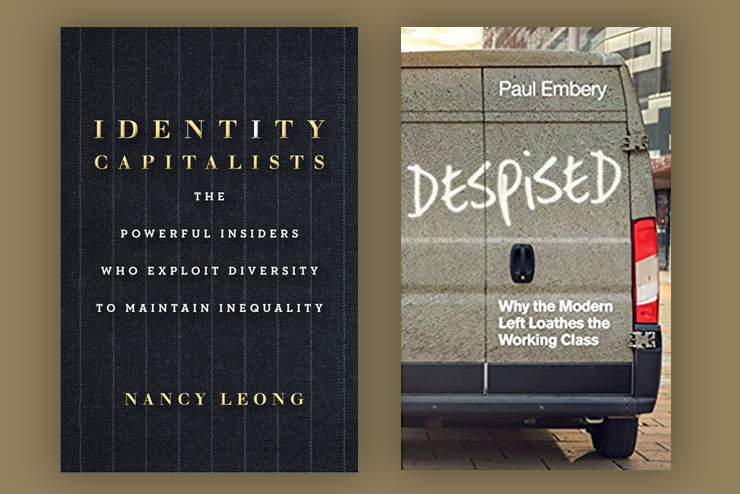Identity Capitalists: The Powerful Insiders Who Exploit Diversity to Maintain Inequality, by Nancy Leong (Stanford University Press; 240 pp., $28.00).
Nancy Leong recounts her chagrin at a friend’s wedding to start her jaundiced polemic, Identity Capitalists. The tipsy bride, gushing with thanks for Leong’s attendance, hugged her before joking indelicately, “I mean if you hadn’t been here everyone here would have been white.” Leong, a law professor, accuses her friend of “identity capitalism,” which she defines as “efforts by ingroup members to benefit from outgroup members.”
Leong’s statistical analysis evokes the Creel Committee’s WWI war propaganda efforts. She submits that “white people tend to exaggerate their relationships with nonwhite people” based on a survey of Harvard and University of Michigan students. That elite subset represents white Americans about as well as Justice Clarence Thomas’ social justice views represent those of NBA players. Yet she dismisses another sample as “not a representative cross-section of Asian Americans” when it contradicts her preferences. And she rejects an amicus brief in Justice Anthony Kennedy’s Gonzalez v. Carhart since its 180 signees “do not represent the views of most women in relation to abortion.” Then she praises as “clever” a sexism study in which male subjects wrongly assumed a fictional nurse was female. I checked with the Census Bureau: 91 percent of nurses are female. Heed the medical school adage, “When you hear hoofbeats, think horses, not zebras.”
Readers will sense that Leong aspires not to resolve America’s identity battles, but to intensify them. Her “When did you stop beating your wife?” style of rhetoric crushes all reasonable dissent. She excoriates Republicans at every turn. She disparages black Trump supporters Diamond & Silk as “identity entrepreneurs” for profiting off their fame. She smears as villainous the in-group consisting of “white, male, straight, wealthy, and so forth,” with “so forth” shorthand for “Christian, capitalist, and carnivorous” if I had to guess. She confesses to teaching at a “predominantly white” law school before reassuring us that she doesn’t like it. Nor do all her colleagues, supposedly. Someone call the police! The entire University of Denver law faculty is being held against its will!
One final takeaway: always remember to scold brides whose weddings aren’t sufficiently diverse.
(John Greenville)

Despised: Why the Modern Left Loathes the Working Class, by Paul Embery (Polity Books; 216 pp., $64.95).
Paul Embery, a firefighter and trade unionist, has written a searing critique of Britain’s modern Labour Party. He believes Labour has betrayed its core constituency, the working class. Rather than reaching out to that traditional base, the current party is “comprised largely of urban middle-class liberals, students and social activists” and has adapted its policies to appeal to this demographic.
Embery highlights three issues that divide the working class from the party that claims to represent them: Brexit, immigration, and what Embery calls “Liberal Wokedom.” The Brexit referendum illustrated the massive gulf between ordinary people and the British political class. While 64 percent of constituencies voted to leave the European Union, only 159 of 650 MPs did. Support for Brexit was particularly strong among the working class and those on low incomes. Working-class communities in northern England were some of the most strongly pro-Brexit. Yet the response of much of the left to the Brexit vote was to show unbridled contempt for those who voted to leave. Leavers were called “thick,” “racist,” and “gammon.”
In his chapter on immigration, Embery provides an interesting history of his East London home in Barking and Dagenham. Once a thoroughly British working-class community in which “the shared backgrounds and cultural familiarity fostered a deep sense of community and cohesion,” the borough has now been transformed beyond recognition by mass immigration.
Embery recounts that on taking his children to a busy public park, of all the many voices and conversations he overheard, “literally nobody” spoke English. But the dismay felt by the native working-class community at this transformation was not treated with any sympathy by their Labour representatives, who inevitably presented their reaction as driven by “innate racism and xenophobia.” The left, says Embery, needs to have a “brutally honest conversation” about immigration, especially its impact on working-class wages.
Embery is also highly critical of the excessive social liberalism of the British left. He is scathing in his assessment of the way the political establishment forced through legislation for same-sex marriage and the subsequent demonization of all who opposed this. He laments the rise of identity politics and thoroughly critiques the “diversity is our strength” mantra.
While Embery is clearly a man of the left and his strong support for socialist economic policies may be unappealing to conservatives, it is nonetheless enlightening to find that there are still a few on the left who hold basically patriotic and socially conservative views.
(Piers Shepherd)

Leave a Reply